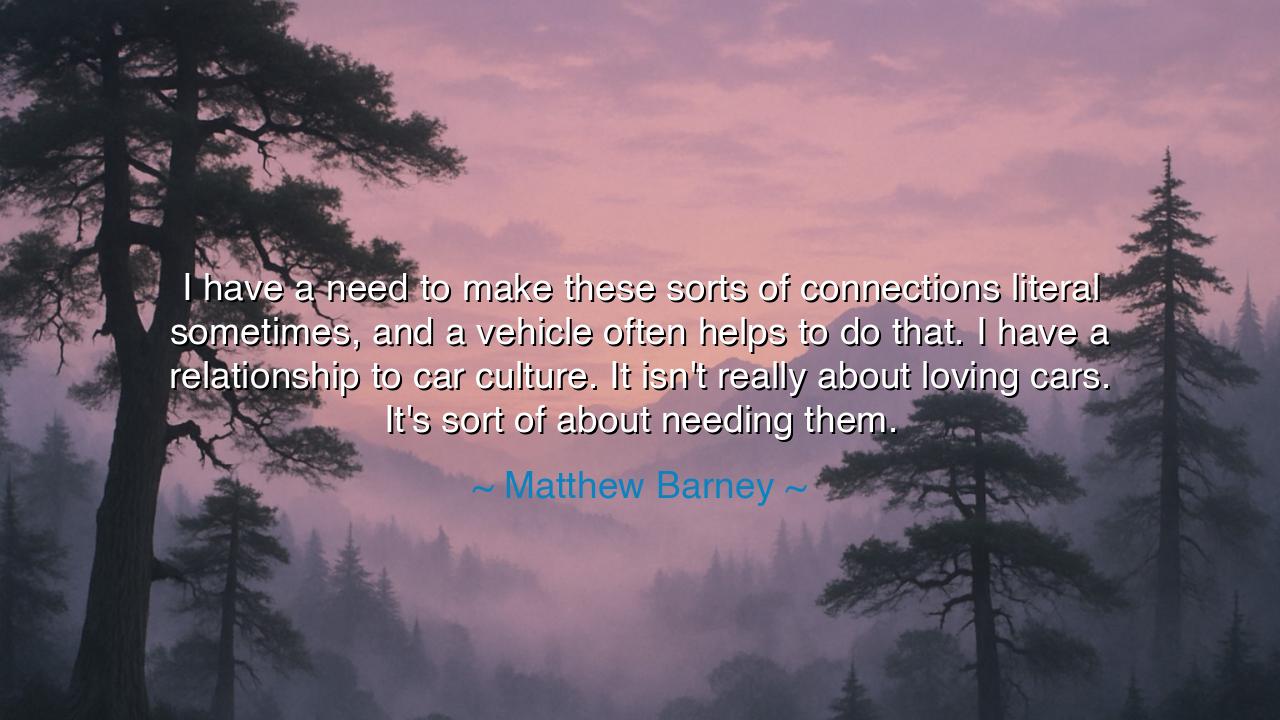
I have a need to make these sorts of connections literal
I have a need to make these sorts of connections literal sometimes, and a vehicle often helps to do that. I have a relationship to car culture. It isn't really about loving cars. It's sort of about needing them.






Hear the words of Matthew Barney, artist of strange visions and deep symbols, who confessed: “I have a need to make these sorts of connections literal sometimes, and a vehicle often helps to do that. I have a relationship to car culture. It isn’t really about loving cars. It’s sort of about needing them.” In this utterance lies the wisdom of necessity transformed into meaning, of objects lifted beyond their common use into vessels of expression.
He speaks of connections, those unseen bonds between ideas, people, and symbols. To render them literal is to take what is hidden in spirit and give it shape in matter, to embody thought in form. For Barney, the vehicle becomes more than transport—it is a bridge, carrying the intangible into the world of sight and touch.
He names his relationship to car culture, not born of passion for speed or beauty, but of reliance. Here is a truth of modern life: that sometimes what we hold close is not what we love, but what we cannot live without. Just as the ancients revered their tools of survival, so in his words the car becomes both burden and companion, not adored for itself but valued for what it enables.
Thus, the wisdom is revealed: love is not the only force that binds man to things—there is also need. To acknowledge this is to see clearly the place of objects in our lives: they are extensions of our will, enablers of our journeys, sometimes symbols of our identity, yet rarely ends in themselves. The car, in Barney’s vision, is a metaphor for necessity dressed as culture.
Therefore, O seekers, remember: not all relationships are of the heart; some are forged of dependence. To recognize the difference is to walk with clarity, neither idolizing what should not be worshiped nor despising what sustains. In this, Barney echoes an ancient truth—that need itself can shape culture, and that in what we need we may discover reflections of who we are. Would you like me to recast this into a parable of the traveler and his cart, to cloak the lesson in the imagery of old journeys?






NLNhu Luong
I find it interesting that Barney distinguishes between loving cars and needing them. It raises the question: are there things in our lives that we don't necessarily love but feel we can't live without? For him, cars seem to symbolize a necessity to interact with the world, not just an object of desire. This makes me reflect on how many aspects of our culture, like technology or fashion, are driven by necessity rather than pure enjoyment.
TTThanh Tran
Matthew Barney's idea of needing cars to make connections literal is intriguing. It seems to be a commentary on how we often use material objects to express ourselves or connect with others. Is this a common human experience? I wonder if this mindset extends to other forms of transportation or even to technology—where the 'need' for certain items isn't about affection but rather about fulfilling a deeper emotional or psychological need.
TTThin Tran
Barney's reflection on his relationship with car culture makes me wonder about the deeper meaning behind everyday objects. It’s not just about having a car; it’s about the role it plays in our lives, how it helps us feel connected to something larger. How many of us have similar needs that go unrecognized? Do we also attach personal or emotional meaning to things in our daily lives without even realizing it?
NTNhi Tran
Matthew Barney's perspective on needing cars, rather than simply loving them, is thought-provoking. Does this mean he sees cars as something functional for human connection, almost like a bridge between oneself and the world? I wonder if this idea extends beyond cars and into other aspects of life where we feel the need to make connections more literal. Can we apply this mindset to relationships, technology, or art?
AHNgoc Anh Hoang
It's fascinating how Matthew Barney talks about a need for vehicles that goes beyond just liking cars. To me, this suggests that cars can serve as more than just transportation—they can be symbols or tools for deeper personal connections. How does the act of driving or owning a car become a way to express one's identity or communicate with the world around them? I’m curious to understand more about this unique perspective on car culture.